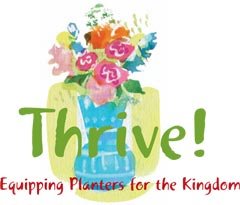"Thrive!" Event Equips Church Planting Teams
When church planting pastors and leaders signed up for "Thrive!," an RCA planter "boot camp" in Orlando, Florida, February 26–March 2, they didn't know they'd spend a morning scrubbing toilets.
As part of a session on evangelism, the event's 75 participants divided up into four groups and headed into the community.
"Some went to start conversations with people they didn't know in the shopping mall," says Randy Weener, who organized "Thrive!" and serves as pastor of Spring Valley Community Church in Allendale, Michigan. "The second group went to a local apartment complex and handed out little cards reminding them that the time change was coming. The third group went to the local university and handed out rolls of Mentos to students. A fourth group went to local businesses, retail stores, and offices and cleaned toilets for them."
Weener says the group made 500 "touch points" with the gospel during the morning, from brief encounters to 15-minute conversations. The point was to meet legitimate needs, start conversations, and see where those conversations went.
The morning was an exercise in needs-oriented evangelism, one of Natural Church Development's eight characteristics of healthy, growing churches. NCD is a church health tool used across the denomination, and "Thrive!" was organized around its eight characteristics. "The goal is to have a strong, balanced foundation for ministry," says Tim Vink, coordinator of multiplication for the RCA.
"Thrive!" is a week of intense training. Church planters met with mentors and coaches throughout the week, participated in workshops, and worked on ministry action plans (MAPs) for their congregation. "The teams get a big poster board and mini sticky notes to plan the next six to 18 months of ministry," Vink says. "They fold up the MAP and take it home, and then go into action mode. We try to get them on a mountaintop with vision and wisdom, and they go back home to the valley and live it out."
Weener says the event also developed "networks of camaraderie" and featured plenty of opportunity for swapping ideas.

